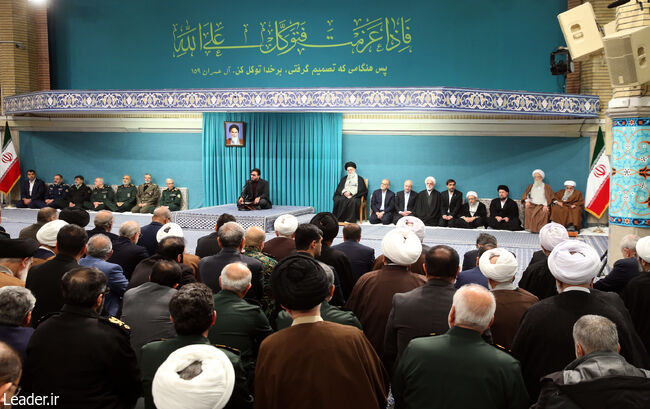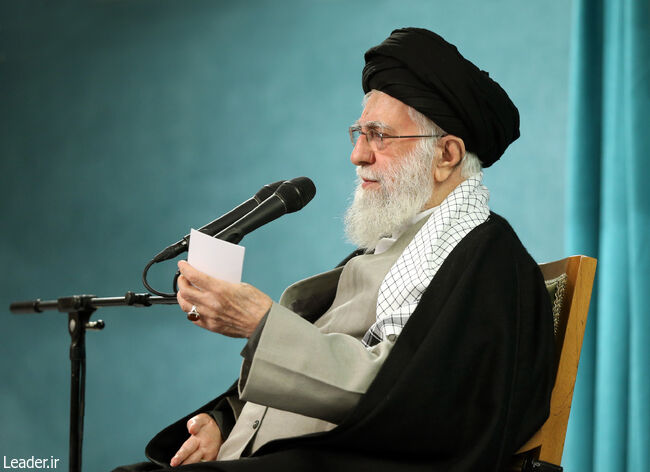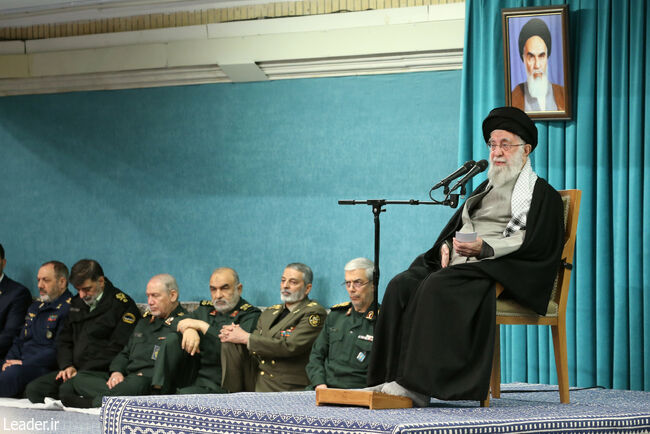The Leader of the Islamic Revolution met today with the heads of the branches of government and a large group of officials and managers from various levels across the country. He offered Ramadan-related advice on individual and societal self-neglect and their consequences. He emphasised the great importance of economic reform and improving people's livelihoods, while also outlining capacities and solutions unrelated to sanctions. He said, "The coordination and cooperation of all branches of government and all levels of management, reforming the financial system, preserving the value of the national currency, providing comprehensive support for production and investment, ensuring swift decision-making and implementation, completing projects efficiently, avoiding indecision and negligence, and taking serious action against smuggling must be prioritised by all officials and institutions."
At the commencement of the meeting, Ayatollah Khamenei recalled the presence of Martyr Raisi in last year's gathering of state officials with the Leader. He said, "The one so loved by us is now the recipient of the rewards for his efforts and services through divine grace and mercy. If all officials viewed their responsibilities as a fleeting opportunity to serve, they too will be encompassed by such grace and mercy."
The Leader of the Revolution expressed his gratitude for the President's insightful and beneficial remarks and praised his motivation and sense of responsibility as highly valuable. He added, "Mr. Pezeshkian's emphasis on trusting God and confidence in accomplishing great tasks is enlightening indeed. God willing, in the not-so-distant future, the President will bring good news to the people about the successful realisation of the major projects he outlined in this meeting, bringing joy to the nation."
Ayatollah Khamenei described the blessed month of Ramadan as the month of remembrance (dhikr) and the Quran as the Book of Remembrance, stating, "Remembrance stands in contrast to heedlessness and forgetfulness, and among all forms of heedlessness, forgetting oneself and forgetting God are the most damaging and irreparable."
Referring to the Quranic verses about the consequences of forgetting God, he said, "If someone forgets God, God will also forget him; that is, he will be removed from the circle of His mercy and guidance, and through indifference, he will be abandoned and forsaken."
The Leader of the Revolution considered self-forgetfulness in both its individual and social dimensions as highly detrimental, stating, "Forgetting the purpose for which God created mankind, which is to attain the status of khalifatullah (God's vicegerent), as well as forgetting death and failing to prepare for the Hereafter are individual aspects of self-forgetfulness. One can be saved from this negligence through remembrance (dhikr), supplication, humility, piety, and acts of worship."
He said that being saved from self-forgetfulness leads to an awareness of the need to be accountable to God, adding, "The majestic presence of God is not a place for making excuses, and not having a justifiable response for every action and word brings humiliation upon a person."
Ayatollah Khamenei described the divine questioning of officials as far more weighty than that of ordinary people, saying, "As officials, we must be extremely vigilant about our behaviour, speech, and actions, and we should resort more to remembrance (dhikr), supplication, seeking intercession, and humility."
Elaborating on the grave social dimensions of self-forgetfulness, he cited a profound verse from Surah At-Tawbah, stating, "If, within the in the system of the Islamic Republic, we act like those before us—namely, the officials of the Tāghūt (tyrannical regimes)—we will have committed an immensely grave and alarming sin that will bring about enormous harm."
The Leader of the Revolution added, "By the grace of God, we have not fallen into this situation so far, but we must be concerned and be cautious so that, by succumbing to social self-forgetfulness, we do not forget our identity, the philosophy of the Revolution, and the foundation of the system. We must not act like the officials and managers of the Tāghūt in domestic and foreign policies, managing the country's affairs, or relying on foreigners."
He described the structure of the Islamic system as being founded on Quranic principles, ideals, and the standards and objectives of the Book and Sunnah, stating, "On this basis, we cannot be followers of Western civilisation. Of course, wherever there is an advantage in the world, including in Western civilisation, we will make use of it, but we cannot rely on Western foundations and standards, as they are flawed and contrary to Islamic values."
Pointing to the disgrace of Western civilisation due to its colonising activities, the plundering of the resources of nations, mass killings, false claims regarding human rights and women's rights, and its double standards on various issues, Ayatollah Khamenei said, "The so-called free flow of information in the West is nothing but a lie. In Western-controlled cyberspace, one cannot even mention the names of figures like General Soleimani, Sayyed Hassan Nasrallah, Martyr Haniyeh, and several other prominent individuals, nor is it possible to protest against the crimes of the Zionists in Palestine and Lebanon."
He recalled the lies propagated by Western media about Iran's situation. He said, "In which of these media outlets is there any mention of Iran's scientific advancements, massive public gatherings, or the successes of the nation and the Islamic system? Meanwhile, they amplify any weakness tenfold."
Citing the statements of some Western sociologists, Ayatollah Khamenei said, "Western civilisation is moving further toward decline with each passing day, and we have no right to follow it."
He mentioned that, despite all the negative propaganda from its adversaries, the increasing dignity of the Iranian nation was a reality. He said, "If the officials of the system preserve the identity and structure of the Islamic system, follow the correct path, and implement the very plans outlined by the President, the country and the great Iranian nation will become even more esteemed. We can become a model for other nations and even for the statesmen of certain countries."
In another part of his speech, which focused on national issues, Ayatollah Khamenei referred to the economic challenges that have persisted since the early 2010s. He said that the primary goal of most enemy threats, including threats to security and intelligence, is to impact the people's livelihood, saying, "Their objective is to make the Islamic Republic incapable of securing the people's livelihood. Therefore, this issue is of great importance, and serious efforts must be made to address and improve it."
He acknowledged the undeniable role of sanctions in creating economic difficulties but also said, "Sanctions are a factor in some of these challenges, but they are not the whole issue. Certain problems have no connection to sanctions at all." Ayatollah Khamenei then outlined some necessary approaches and actions for resolving economic issues, emphasising that internal coordination among institutions within the government and among the three branches of power is one of the highest priorities. He said, "The first condition for progress is cohesion. Fortunately, there is excellent unity at the higher levels, but this unity must also extend to the lower levels and throughout the administrative structure."
He stressed the fundamental impact of swift action in economic matters and criticised the slow pace and long gaps between ideas, decision-making, implementation, and the realisation of results. He added, "This issue is mainly due to inadequate follow-up on affairs. For this reason, one of my constant recommendations to presidents and officials has been to ensure proper follow-up and supervision and not to abandon tasks at various stages."
The Leader of the Revolution described some officials' perception that "the safest course of action is to avoid making decisions," as dangerous, stating, "If an official holds back from making decisions out of fear of scrutiny and accountability, this is a wrongful act and will be subject to divine reproach. For God not only holds people accountable for their actions but also for their inactions."
Ayatollah Khamenei cited officials' awareness of the country's capacities as another key factor in solving economic problems. He said, "It is often said that the country possesses abundant capacities and potential, but the depth of this reality is not fully appreciated."
He described the youth, with their astonishing creativity and innovations in various economic, scientific, and research fields, as another great capacity of the country. He added, "Another significant capacity is our natural resources, including oil and mineral reserves, which are among the richest and most valuable in the world. Many of these resources have yet to be discovered and utilised."
He described preserving the value of the national currency as essential and absolutely necessary, saying that maintaining its value was crucial for improving people's livelihoods, increasing their purchasing power, and enhancing the country's dignity and credibility. He further emphasised, "In this regard, the repatriation of foreign currency earnings from exports is of great importance."
Ayatollah Khamenei referred to Martyr Raisi's plan to compel large state-owned companies with foreign exchange earnings to implement major water, refinery, and power plant projects in certain regions of the country. He said, "However, the report he was given regarding the actions of these companies was meaningless. In any case, it is unacceptable for the foreign currency earnings of state-owned companies not to be placed at the disposal of the government and the central bank, and a solution must be devised to address this issue."
He mentioned that another priority for the country's economy is production. He said, "Legal support, resource allocation for production, removing obstacles and unnecessary regulations, and advancing production technology are essential measures. Added to this, the people, especially government institutions, must be committed to meeting domestic needs through local production, and products that are available domestically should not be imported and consumed."
The final point regarding economic matters that the Leader of the Revolution addressed was the issue of investment. He said, "One of the objectives of the sanctions was to hinder foreign investment, but there are ways to overcome this challenge." He added, "The most important factor in increasing domestic investment is facilitating the process for investors so that they feel confident that investing will bring them good returns and profits."
In the final part of his speech, Ayatollah Khamenei expressed satisfaction with the active role of the Ministry of Foreign Affairs and emphasised expanding engagement with neighbouring and other countries. He stated, "Some arrogant governments and foreign figures insist on negotiations, but their aim is not to resolve issues. Rather, they seek to dominate and impose their own demands. If the other party agrees, so much the better; but if they refuse, they create an uproar and accuse the other side of abandoning negotiations."
The Leader of the Islamic Revolution continued, "Their issue is not just about nuclear matters. For them, negotiations are a means to raise new demands, including in the areas of defence capabilities and international influence, and to express expectations such as 'don't do this,' 'don't meet with that individual,' 'don't increase the range of missiles beyond a certain limit.' Certainly, Iran will not accept or fulfil such demands."
He mentioned that the opposing side's insistence on repeated negotiations aims to exert pressure on public opinion. He said, "They seek to create doubt in public perception by asking why we are unwilling to negotiate despite their declared readiness for talks. However, their goal is not negotiation, but domination and imposition."
Referring to the statement by three European countries accusing Iran of not fulfilling its nuclear commitments under the JCPOA (Joint Comprehensive Plan of Action), Ayatollah Khamenei noted, "They should be asked, did you fulfil YOUR commitments under the JCPOA? They failed to fulfil their commitments from the very beginning, and after the U.S. withdrawal from the JCPOA, despite their promises to compensate for it, they broke their word twice."
The Leader of the Revolution described the Europeans' breach of commitment while at the same time accusing Iran of non-compliance as a sign of their extreme shamelessness. He added, "The government at the time endured that situation for a year, and then the Islamic Consultative Assembly stepped in and passed a resolution, as there was no other way. Even now, there is no alternative in the face of coercion and bullying."
At the beginning of the meeting, the President provided an overview of the government's latest efforts toward internal unity and achieving the system's development vision. He announced the implementation of five major economic programs, stating, "The government is focused on executing plans for production growth, controlling inflation, addressing livelihood challenges, resolving economic imbalances, and implementing strategic and national projects."
Mr Pezeshkian described power and gas outages in some areas of the country as necessary measures to prevent severe crises. He expressed the hope that, according to the plan, energy sector imbalances would be resolved in the coming year.
Referring to the need to maximise the capacities of neighbouring countries and Iranians abroad, the President affirmed that the Fourteenth Administration supports domestic and foreign investors. He also announced the preparation of several major investment projects in the country.
Emphasising the principles of "dignity, wisdom, and expediency" in foreign policy, Mr Pezeshkian mentioned national unity as the main barrier to the realisation of any threat by the country's enemies. He added, "No power can defeat a nation that relies on God and acts in unity behind its Leader."
At the beginning of his remarks, the President highlighted points about the blessed month of Ramadan, describing it as an opportunity to reinforce the implementation of justice, avoid discrimination, practise honesty, assist those in need, reconciliation among people, and eliminate oppression and corruption. He said, "Religious texts are not merely for reading but for acting upon, and this requires unity, mutual tolerance, and cooperation between the people and officials."



